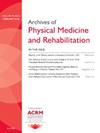更年期与创伤性脑损伤:NIDILRR 协作性创伤性脑损伤模型系统研究。
IF 3.6
2区 医学
Q1 REHABILITATION
Archives of physical medicine and rehabilitation
Pub Date : 2024-12-01
DOI:10.1016/j.apmr.2024.07.021
引用次数: 0
摘要
目的:研究创伤性脑损伤(TBI)女性更年期症状的经历:研究创伤性脑损伤(TBI)女性更年期症状的经历:设计:横断面描述性研究:地点:创伤性脑损伤示范系统(TBIMS)项目的五个地点:参与者:210 名女性,年龄在 40-60 岁之间,未服用系统性荷尔蒙且未切除双侧卵巢:有 61 名参与者参加了 TBIMS 计划,她们在创伤后应激反应后至少 2 年在社区生活。从研究登记处和底特律大都会社区招募了 149 名未患 TBI 的参与者:干预措施:不适用:主要结果测量:由 21 个更年期症状组成的检查表,评估四个症状集群(血管运动、躯体、心理和认知):结果:创伤性脑损伤组和非创伤性脑损伤组没有明显差异,在血管运动症状方面显示出较小的效应大小。在其余症状群中,有创伤性脑损伤的妇女比没有创伤性脑损伤的妇女表现出更多的症状和更严重的症状,绝经前和绝经后妇女在这些症状上的差异也更小。没有观察到表明创伤性脑损伤对更年期症状有叠加或增效作用的特征:研究结果支持更年期和创伤性脑损伤的概念模型,表明与雌激素下降最密切相关的症状在有创伤性脑损伤和没有创伤性脑损伤的妇女中相似,而与常见创伤性脑损伤后遗症重叠的症状在这些妇女中通常更为频繁和严重。可能是由于绝经前症状基线较低,绝经后无创伤性脑损伤的妇女报告的症状比绝经前无创伤性脑损伤的妇女更多和更严重。总的来说,没有创伤性脑损伤的妇女更年期的经历可能更多的是生活的 "改变",而有创伤性脑损伤的妇女长期面临的这些症状明显多于没有创伤性脑损伤的妇女。本文章由计算机程序翻译,如有差异,请以英文原文为准。
Menopause and Traumatic Brain Injury: A NIDILRR Collaborative Traumatic Brain Injury Model Systems Study
Objective
To examine the experience of menopause symptoms in women with traumatic brain injury (TBI).
Design
Cross-sectional descriptive study.
Setting
Five sites of the TBI Model Systems (TBIMS) program.
Participants
Participants were 210 women, aged 40-60 years, who were not taking systemic hormones and did not have both ovaries removed: 61 participants were enrolled in the TBIMS, who were at least 2 years post-TBI and living in the community. One hundred forty-nine participants without TBI were recruited from a research registry and the metropolitan Detroit community.
Interventions
Not applicable.
Main Outcome Measures
A checklist comprised of 21 menopause symptoms assessing 4 symptom clusters (vasomotor, somatic, psychological, and cognitive).
Results
TBI and non-TBI groups did not significantly differ and showed small effect sizes on vasomotor symptoms. On the remaining symptom clusters, women with TBI showed greater presence and severity of symptoms than women without TBI, as well as fewer differences between premenopausal and postmenopausal women on those symptoms. A profile indicating an additive or potentiating effect of TBI on menopause symptoms was not observed.
Conclusions
Findings support a conceptual model of menopause and TBI indicating that symptoms most closely associated with estrogen decline are similar for women with and without TBI, whereas symptoms that overlap with common TBI sequelae are generally more frequent and severe among these women. Likely because of lower baseline of symptoms premenopause, postmenopausal women without TBI reported more numerous and severe symptoms relative to their premenopausal counterparts without TBI. Overall, it may be that women without TBI experience menopause as more of a “change” of life, whereas women with TBI chronically face significantly more of these symptoms than women without TBI.
求助全文
通过发布文献求助,成功后即可免费获取论文全文。
去求助
来源期刊
CiteScore
6.20
自引率
4.70%
发文量
495
审稿时长
38 days
期刊介绍:
The Archives of Physical Medicine and Rehabilitation publishes original, peer-reviewed research and clinical reports on important trends and developments in physical medicine and rehabilitation and related fields. This international journal brings researchers and clinicians authoritative information on the therapeutic utilization of physical, behavioral and pharmaceutical agents in providing comprehensive care for individuals with chronic illness and disabilities.
Archives began publication in 1920, publishes monthly, and is the official journal of the American Congress of Rehabilitation Medicine. Its papers are cited more often than any other rehabilitation journal.

 求助内容:
求助内容: 应助结果提醒方式:
应助结果提醒方式:


